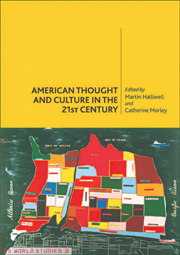Book contents
- Frontmatter
- Contents
- Acknowledgements
- Notes on the Contributors
- Introduction: The Next American Century?
- PART 1 POLITICS
- 1 American Politics in the 1990s and 2000s
- 2 American Leadership into the New Century
- 3 9/11 and US Foreign Policy
- 4 Three Variations on American Liberalism
- 5 The Rise of Postmodern Conservatism
- 6 US Propaganda
- PART 2 SOCIETY
- PART 3 CULTURE
- Bibliography
- Index
2 - American Leadership into the New Century
from PART 1 - POLITICS
Published online by Cambridge University Press: 05 August 2013
- Frontmatter
- Contents
- Acknowledgements
- Notes on the Contributors
- Introduction: The Next American Century?
- PART 1 POLITICS
- 1 American Politics in the 1990s and 2000s
- 2 American Leadership into the New Century
- 3 9/11 and US Foreign Policy
- 4 Three Variations on American Liberalism
- 5 The Rise of Postmodern Conservatism
- 6 US Propaganda
- PART 2 SOCIETY
- PART 3 CULTURE
- Bibliography
- Index
Summary
In 1987, George Shultz, Secretary of State under President Reagan, declared that ‘the great ideological struggle that has marked this century ever since the Bolshevik revolution of 1917 has essentially been decided’. Speaking two years before the fall of the Berlin Wall, George Shultz was a little premature in proclaiming the termination of the Cold War. However, the significance, not least for American thought and culture, of the late 20th-century ideological and material ‘victory’ over Soviet communism can scarcely be overstated. The international business of the 20th century – admittedly diverted by the rise of fascism in the 1930s – was the contest between communism (or at least bureaucratised state socialism) on the one hand and democratic capitalism on the other. The geopolitical cataclysm symbolised by the crashing wall in Berlin appeared not only a vindication of national mission and American exceptionalism. It also seemed to signify, as Francis Fukuyama famously put it, that ‘all the really big questions had been settled’ – in favour of America and the liberal idea.
The present chapter concerns itself with ideas of American global leadership as they developed between 1989 and the first decade of the new century. The discussion will then turn to consider leadership in a domestic context. Just as Fukuyama's ‘end of history’ had huge implications for American leadership in the world, so did the end of the Cold War and the onset of the War on Terror profoundly affect concepts of leadership at the national level.
- Type
- Chapter
- Information
- American Thought and Culture in the 21st Century , pp. 35 - 48Publisher: Edinburgh University PressPrint publication year: 2008

